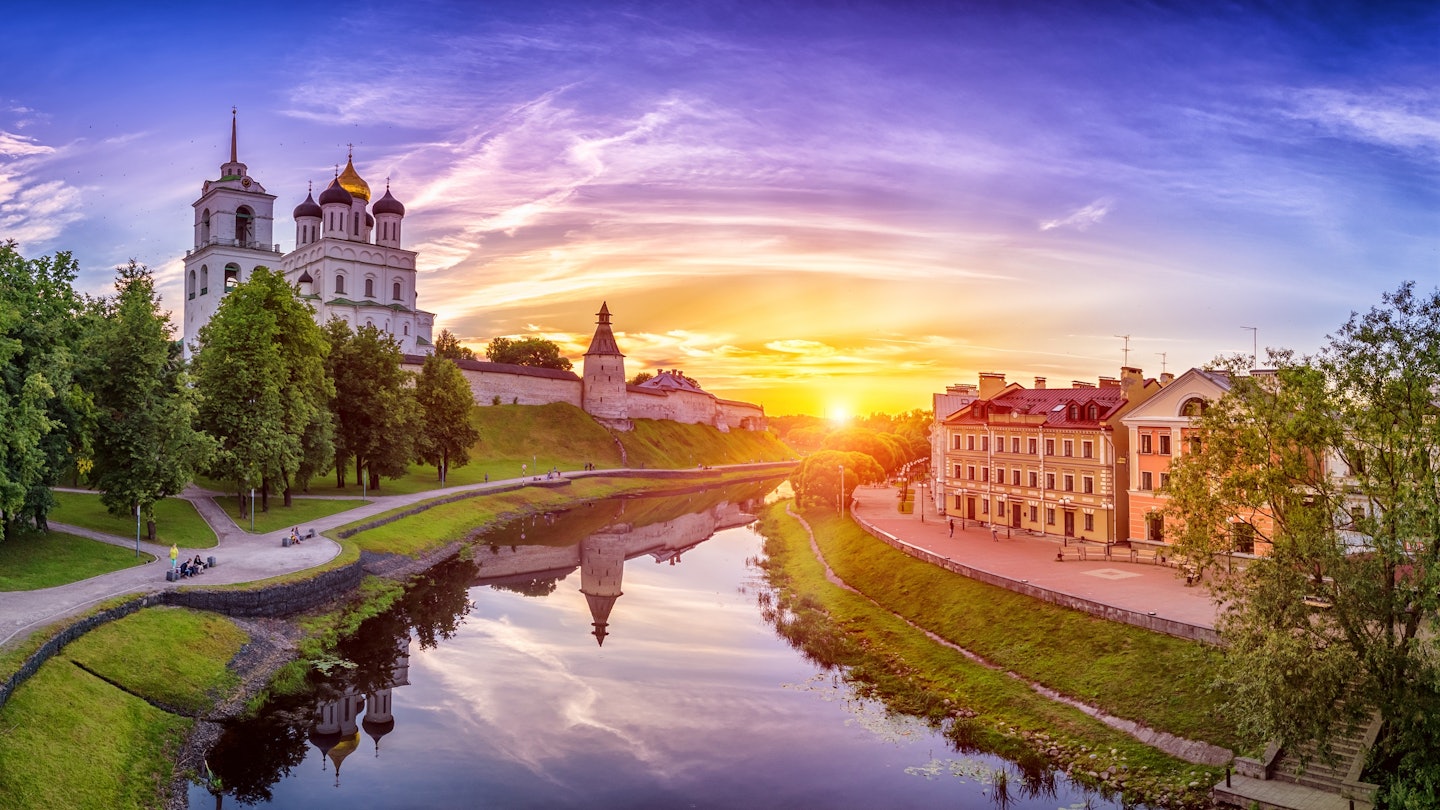
The 30 best countries, cities and regions to visit in 2025
Nov 28, 2019 • 4 min read

The kremlin in Pskov, with the golden dome of Trinity Church © Tanya Sid / Shutterstock
Endearing, but slow and not terribly comfortable, Russia's old-school sleeper trains are giving way to a new generation of faster day trains, much like those used elsewhere in Europe. Coupled with a gradual transformation of smaller cities and towns which were neglected in the past, this opens up a region in Russia for travellers to explore. This is Russia's northwest, where new Lastochka trains now connect some of the most popular tourist destinations, forming a triangular route that originates in St Petersburg and connects Petrozavodsk in Karelia with the ancient cities of Novgorod and Pskov in the south.

The capital of the Republic of Karelia and one of Russia’s prime outdoor destinations, Petrozavodsk is a gateway to the unspoiled glacial lake country on the Finnish border which draws thousands of primarily Russian adventure tourists in the summer months. Consult with the local Nordic Travel and the Moscow-based RussiaDiscovery NorthWest for details about rafting, trekking and other tours.
The main reason travellers visit Petrozavodsk is to see the majestic Transfiguration Church on the island of Kizhi, accessed by hydrofoil from a jetty on the banks of Lake Onega. The 30-domed church made entirely of wood and without a single nail is the gem of the Kizhi Museum Reserve that displays a few dozen other examples of wooden architecture brought to the island from all over Karelia in the Soviet era.
Now a minority in their own land, ethnic Karelians are closely related to Finns. To learn more about their culture, head to the Museum of Regional Studies. For local culinary heritage, try Karelskaya Gornitsa.
Petrozavodsk is a pleasant city with a visible Finnish influence and plenty of accommodation, including Mini-Hotel Ilma, which also contains a hostel.
There are two Lastochka trains a day from St Petersburg to Petrozavodsk. The journey takes around five hours. Conventional overnight trains make this journey in 7½ hours.

The cradle of Russian statehood and the country’s oldest city, Veliky Novgorod is packed with medieval architecture, including the Novgorod kremlin, a 14th-century fortress that contains the city’s main historical sights. Inside the kremlin, the enormous 19th-century 1000 Years of Russia Monument contains sculptural depictions of every Russian prince, tsar and hero that matters. There's also the excellent Novgorod State United Museum, along with the 11th-century St Sophia Cathedral, which is Russia’s oldest church.
You’ll need plenty of time to explore the rest of Novgorod’s medieval legacy, so overnight is a must. Hotel Volkhov is a reliable tourist-oriented establishment in the very centre. For traditional Russian food, head to Dom Berga located in a 19th-century merchant’s house. For modern chic, check out the converted industrial space of Zavod Bar.
Pskov-bound Lastochka leave Petrozavodsk just before 11am and reach Veliky Novgorod at 5.30pm. The same train continues to Pskov, arriving there just before 10pm.

Novgorod’s junior and, occasional rival in medieval times, Pskov is graced with a stunning fortress, the Pskov kremlin, which looks like a Viking battleship cutting the water at the confluence of the Velikaya and Pskova rivers. Among Pskov’s many medieval architectural treasures, there is one that stands out. Cathedral of the Transfiguration of the Saviour, located inside Mirozhsky monastery, contains an array of 12th-century frescoes that are considered to be the most complete representation of biblical narrative predating the Mongol invasion of Russia, when most of the church art from that period perished.
Pskov is an entry point for Russia from the EU. Two checkpoints on the Estonian border are about 60km away. One is on the road to Tallinn and goes past the ancient town of Stary Izborsk and the famous Pechory monastery, with its eerie burial cave complex. The other is on the road that leads to Riga in Latvia (it passes through Estonia for a short stretch).
With fantastic views of the river and the kremlin, Hotel 903 is one of the best places to overnight at Pskov. The upmarket Rusakov restaurant, which also comes with a river view, serves classic Russian cuisine and wine from the Russian Black Sea coast.
Hilly and picturesque, with plenty of lakes and rivers, Pskov region is undergoing a low-key revival as a domestic tourism destination, with interesting hotels and lodges popping up in the countryside. A few of them cluster around Mikhailovskoe, the estate of the country’s most venerated poet, Alexander Pushkin. Arina R. is a commendable rural-style hotel in the vicinity.
Four Lastochka trains a day connect Pskov to St Petersburg in 3½ hours.

Domestically-produced, Lastochka trains were developed by Siemens following the same design template as Heathrow Airport trains in London and their equivalents across the UK, Germany, Israel and many other countries. The interior is a tad spartan, but it’s still a huge leap forward in making Russian travel faster and more comfortable. For schedules and tickets, go to the official Russian Railways website or better still, download the Rail Russia app on your smartphone.
Russia for first-timers: dos and don’ts
The ultimate guide to historic St Petersburg
Five great day trips from St Petersburg